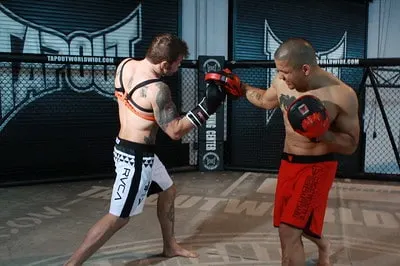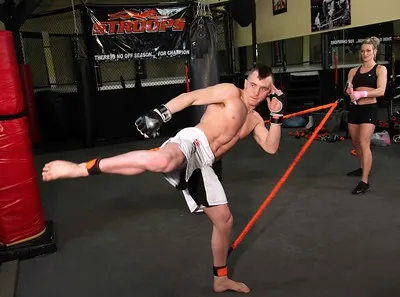
The function of MMA continues to evolve in modern society. Today, self-defense and sport are the primary applications of MMA. However, there are lesser-known benefits of learning MMA as a hobbyist that can be discussed. There are also safety concerns and gripes when it comes to learning MMA.
Many natural questions arise as a result of this. Will learning MMA make you a better person? Can learning MMA replace your workout? To answer some of these questions and gain a better understanding of both sides of this discussion, let’s explore a growing argument about the pros and cons of learning MMA, so you’re better informed to decide for yourself.
MMA Is An Effective Self-Defense System (Pros)
Among the pros of MMA, the self-defense system has been proven to work effectively. Many techniques have been brought together and combined from different martial arts. For example, a single leg takedown taught in Brazilian Jiu-Jitsu will be taught with a modified head position to account for strikes from the opponent. In this way, the techniques continue to be developed for all situations to offer the most comprehensive self-defense system out there.
These skills have been tried and tested in competition against a trained opponent and they’ve also been tested on the streets. Even if the arts are practiced for sport, beginners can enjoy a great deal of carryover if they end up in a situation where they need to defend themselves.
More notably, certain techniques revolve around using leverage to your benefit to overcome a larger, stronger aggressor. This is especially advantageous for genetically smaller and weaker individuals. If you learned a single martial art such as boxing, you won’t necessarily have an advantage against a bigger opponent.
Having the knowledge necessary to defend a friend or a relative can sometimes be the difference between life or death. With crime rates going up in many parts of the world, you’ll eventually run into a situation where you’ll need to protect yourself or someone else.
The confidence to pull off these techniques in stressful situations is also an overlooked part of self-defense. MMA teaches you the management of stress hormones like cortisol and adrenaline as well. Although MMA training is not the be-all and end-all of self-defense, it will give you a significant advantage over untrained or unarmed attackers.
MMA Offers Incredible Physical Benefits (Pros)
Be ready to enjoy many physical benefits if you choose to learn MMA. For starters, your coordination and control over your body improve drastically. Distance, timing, and balance are all factors that play a key role in MMA, and they get sharpened while you learn the arts.

The sport is very dynamic, so you’ll learn how to put together combinations that flow. Even if you’re clumsy, training MMA will allow you to improve your coordination and become a better athlete overall.
Cardio is something everyone wishes they could improve. Aerobic conditioning is responsible for getting oxygen to your muscles efficiently. MMA training like hitting the heavy bag or skipping rope is a great way to improve your cardio. Better cardio will help you fight heart disease and leave you in a great mood.
One benefit that becomes more noticeable the longer you train is improved strength and flexibility. You’ll develop a lot of muscles that you don’t normally use in everyday life. You’ll even activate ones that you unknowingly neglect with traditional strength training. A lot of these muscles can get really weak if you sit for too long, so it’s important that you give them the training they deserve.
A lot of sports focus on one muscle group only. Cyclists and soccer players have strong legs. Boxers have strong shoulders and a core of steel. With MMA, you can rest assured it’ll be a full-body workout.
MMA Is Humbling And Instills Respect (Pros)
The Dunning-Kruger Effect states that people tend to overestimate their own abilities when it comes to an activity they’re incompetent at. MMA training serves as a reality check and breaks the mental delusion of competence. This delusion in and of itself is dangerous. In other words, a person could be in a high-risk situation and trick themselves into thinking they have it under control.
Before training MMA, beginners grossly mismeasure their ability to control a situation gone awry. Conversely, when those people start training MMA, they experience a period of humbling. The discrepancy in estimated skill and actual skill becomes apparent when they spar with a training partner or grapple on the mats. Although sparring is not as stressful as a real-life scenario, it does a great job of replicating the conditions in which MMA may be used.
MMA training helps us understand true threats and dangers. When someone is put in a compromising position in training or is defeated during a sparring competition, it acts as an indicator of the reality of violence. If this were real life, it would have ended much differently. It’s a motivator to act appropriately in public when altercations arise. Much of the population have no clue what to do in a situation where the stakes are high, and this is dangerous for all parties involved.
MMA Develops Self-Confidence (Pros)
MMA develops the confidence needed to achieve anything you set your mind to. When you begin your training, you may feel overwhelmed by the number of techniques you have to learn. However, the more you train, you will come to realize that you can hold your own and even overtake your training partners after a while.
In training MMA, you will begin to learn that you can accomplish anything if you put in the hard work and stay dedicated.
As alluded to previously, this benefit is one that transfers into other areas of life. Confidence to be more social is something you can look forward to if you decide to embark on this journey. Since you will be training in a discipline with other people, you will inevitably increase your social contact. You may find yourself asking questions to an instructor or working through a technique with a fellow student.
Improving the physical fitness and look of your body is an exceptional benefit. This will no doubt raise your confidence to another level. Regardless of which combination of martial arts you choose to train, they will burn hundreds of calories and improve your muscle to fat ratio also known as “body composition”.
Having the confidence to take risks in life is also another huge proponent of MMA training. If you’re someone who always plays it safe in life, MMA will teach you that intelligent risk should be embraced. It opens the doors to experimentation and play, and ultimately if you take a risk in training and it fails, you can always reset and go back to the drawing board.
MMA Comes With Injuries (Cons)
Injuries are prevalent in MMA, especially if you’re new to training. Since MMA is essentially learning how to fight, you can expect some chance of injury. Punching, kicking, and submissions are all activities where you’ll need to risk your body to improve at MMA. Also, your body won’t be used to the new movements you’re learning, and you’ll end up in some awkward positions.
A study done by Joseph L. Torres, MD at the Florida Sports and Health Centre, concluded that most injuries were inflicted on the upper body. This is easy to see since the objective of a fight is to knock your opponent unconscious or submit them. Not only that, but all fights start standing up. This means that there is a higher chance striking will happen before the fight hits the ground.
Looking at the injuries on the upper body, arm injuries were the most common. One example of an upper-body injury is the armbar. It’s a common submission used in jiu-jitsu. An armbar works by hyperextending the elbow joint. The person on the receiving end of this nasty submission is forced to tap or end up with a broken arm.
Severe MMA injuries risk your mobility later in life and they can leave long-lasting, nagging effects.
MMA Is Not Weapon Proof (Cons)
Weapons have been getting much easier to get and they pose a serious threat to the general public if misused. The self-defense techniques taught in MMA do a decent job of disarming such an attacker. It’s not a blanket solution to the problem of weapons though. MMA can only go so far. At the end of the day, weapons can easily nullify MMA because of their ease of use and accessibility.
Some martial arts include weapons as a part of their practice. Canes, spears, swords, and daggers are all used in martial arts, just to name a few. However, the sport aspect of martial arts does not use any weapons and people generally don’t carry weapons in public, so the focus should be on unarmed combatants.
It’s much easier to be trained in the use of a powerful weapon. Likewise, a concealed carry of pepper spray or a similar substance is a more convenient option. For this reason, many people find the commitment of training MMA for self-defense obsolete.
MMA Does Not Deal With Multiple Assailants (Cons)
Taking on multiple assailants is nothing like you see in the movies. The hero is often surrounded by multiple enemies and they attack one by one, letting him defeat them. The obvious problem with this is that it’s unrealistic.
Can you realistically fight more than one opponent? Truthfully, no MMA style is fully adept at taking on more than one attacker. It depends on how well you are trained. At best, you may be able to knock out or submit one or two attackers. As soon as you get to four of five, things will change. Let’s hope that finishing one or two of the assailants is enough to discourage the others from attacking.
When dealing with multiple attackers, you’ll have to make sure that the fight stays standing. Once you hit the ground with one person. You’re at risk of being hit by kicks from the other person(s). How unskilled the group of people attacking you is a huge part of this equation, and probably the more important bit. Weapons factor in as well. If your attackers are unarmed, you stand a much better chance of survival.
If you’re wanting to learn MMA for the purpose of fighting many people at once, prepare yourself for disappointment. The fights that we see in movies are not an accurate depiction of reality.
MMA Has Too Many Techniques To Master (Cons)
From jabbing to sprawling and guard passing, learning MMA can be challenging due to the number of techniques you need to master. One session you’ll be striking, another session you’ll be grappling and it can get overwhelming at times. On top of all that, you need a certain level of mastery to apply the techniques together to make them flow.
MMA is constantly evolving as new strategies are discovered. What may have been an effective technique at one time, might be obsolete now, and you’ll need to learn something completely new. Counters are also something that need to be mastered for every move. A counter is essentially a technique that nullifies or renders your opponent’s attack useless.
There are fundamental MMA techniques that are universally taught no matter where you go. Contrast this with the number of MMA techniques that are not shared across schools and you end up with a lot of different moves.
To expand this idea further, certain coaches will teach the moves they are personally exceptional at, leaving lesser-known moves on the back burner. This means that you’ll often encounter situations where you’re up against a move you’ve never seen before. Fear of the unknown is something you’ll have to embrace if you wish to learn, and master MMA.
Conclusion
Starting your journey to learn MMA can be tough and it comes with its own hurdles, but I can assure you it’s incredibly rewarding. It’s an intense, demanding workout and the benefits reach further than regular exercise. Learning MMA won’t make you a world killer, but it’s definitely a great skill to have in your back pocket, should the need to defend yourself, or another arises.
If your normal workout routine is getting a little stale, or you have a hard time dragging yourself into the gym, then you might want to drop into an MMA class. You’ll be glad you did.
